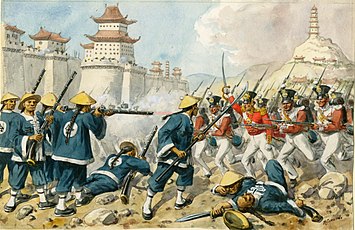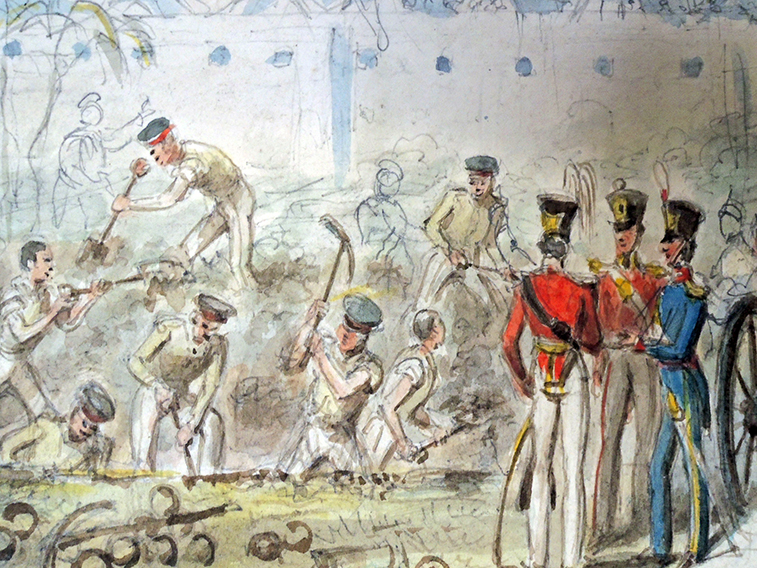Describe the reasons and consequences of first Opium War
Introduction about Opium War
The Opium Wars, comprising two significant military conflicts in the mid-19th century, stand as pivotal events in Chinese history, marking the clash between traditional Chinese society and the forces of Western imperialism. Rooted in the trade of opium, these wars exemplify the profound impact of economic interests on international relations during the era of imperialism.
In the early 19th century, the British East India Company, seeking to address a trade imbalance caused by its substantial imports of tea from China, began exporting opium grown in British-controlled India to China. This opium trade flourished despite Chinese attempts to suppress it, leading to widespread addiction and social disruption within Chinese society.
The Chinese government’s efforts to halt the opium trade culminated in the confiscation and destruction of British opium shipments, sparking the First Opium War (1839–1842). The conflict, characterized by unequal military technologies and tactics, resulted in China’s defeat and the signing of the Treaty of Nanking in 1842. This treaty granted significant concessions to Britain, including the cession of Hong Kong and the opening of additional Chinese ports to British trade.
The Second Opium War (1856–1860) erupted due to renewed tensions over the opium trade and broader issues of Western influence in China. This time, Britain was joined by France, and together they achieved another decisive victory over the Qing dynasty. The resulting Treaty of Tientsin (1858) and the Convention of Peking (1860) further expanded Western influence in China, opening more treaty ports and legalizing the opium trade.
The Opium Wars serve as a stark illustration of the power imbalances and injustices inherent in imperialist endeavors, highlighting the exploitation of China by Western powers for economic gain. They also catalyzed a period of significant upheaval and reform within China, ultimately contributing to the decline of the Qing dynasty and the modernization of the country.
Reasons of first Opium War
The First Opium War was primarily driven by a convergence of economic, political, and social factors that culminated in conflict between China and Britain:
-
Opium Trade: The root cause of the war was the lucrative opium trade, which had grown substantially in the early 19th century. British merchants, supported by the British East India Company, were exporting vast quantities of opium from British-controlled India to China. This trade, although illegal in China, was highly profitable for British traders and contributed significantly to Britain’s economy.
-
Trade Imbalance: Britain faced a substantial trade deficit with China, primarily due to the Chinese demand for tea and silk. To address this imbalance, British merchants resorted to the opium trade as a means to increase exports to China and offset their trade deficit. The opium trade thus became crucial for Britain’s economic interests in the region.
-
Chinese Attempts to Suppress Opium: Concerned about the social and economic consequences of widespread opium addiction, the Chinese government attempted to suppress the opium trade. In 1839, Chinese authorities confiscated and destroyed a large quantity of British opium, sparking outrage among British traders and leading to diplomatic tensions between China and Britain.
-
Diplomatic Crisis: The seizure of British opium triggered a diplomatic crisis between China and Britain. The British government demanded compensation for the confiscated opium and sought to protect the interests of British traders in China. However, Chinese authorities remained adamant in their opposition to the opium trade and refused to comply with British demands.
-
Escalation to War: Diplomatic efforts to resolve the dispute failed, and tensions between China and Britain continued to escalate. In response to the Chinese government’s refusal to address British grievances, Britain launched military operations against China in 1839, initiating the First Opium War.
In summary, the First Opium War was fueled by Britain’s economic interests in the opium trade, China’s attempts to suppress the trade, and the resulting diplomatic tensions between the two countries. The conflict ultimately erupted due to the inability of diplomatic channels to resolve the underlying disputes, leading to armed confrontation between China and Britain.
Consequences of first Opium War
The First Opium War had far-reaching consequences that reshaped the political, economic, and social landscape of China and the wider world:
-
Treaty of Nanking (1842): The war concluded with the signing of the Treaty of Nanking, which imposed significant concessions on China. These included the cession of Hong Kong to Britain, the opening of five treaty ports for British trade, and the establishment of extraterritorial rights for British citizens in China. The treaty marked the beginning of a series of unequal treaties that would weaken China’s sovereignty and lead to further foreign encroachments.
-
Foreign Influence: The Treaty of Nanking opened China to increased foreign influence, paving the way for other Western powers to secure similar concessions and expand their economic and political presence in China. This influx of foreign traders, missionaries, and diplomats introduced Western ideas and technologies to Chinese society, contributing to both modernization and cultural tensions.
-
Opium Trade Legalization: One of the provisions of the Treaty of Nanking was the legalization of the opium trade in China. This further exacerbated the problem of opium addiction and social instability within Chinese society, leading to widespread suffering and moral degradation.
-
Loss of Prestige: The defeat in the First Opium War and the subsequent unequal treaties dealt a significant blow to the prestige and authority of the Qing dynasty. The inability of the Qing government to defend China’s sovereignty against foreign aggression exposed its weakness and eroded public confidence in the ruling regime.
-
Internal Reforms: The humiliation of the First Opium War prompted a reevaluation of China’s military, economic, and political systems. In response to the challenges posed by Western imperialism, the Qing government initiated a series of internal reforms aimed at modernizing China’s institutions and strengthening its military capabilities. These reforms, however, were met with resistance from conservative factions within the government and society.
-
Long-Term Consequences: The First Opium War set the stage for further conflicts and tensions between China and Western powers, culminating in the Second Opium War and the Boxer Rebellion. The unequal treaties signed during this period continued to shape China’s relations with the outside world well into the 20th century, contributing to China’s century of humiliation and eventual pursuit of national rejuvenation.
In summary, the consequences of the First Opium War were profound and enduring, profoundly impacting China’s sovereignty, economy, and social fabric while also catalyzing significant changes in Chinese governance and foreign relations.
Question:प्रथम अफ़ीम युद्ध के कारणों एवं परिणामों का वर्णन कीजिये
अफ़ीम युद्ध का परिचय
अफ़ीम युद्ध, जिसमें 19वीं सदी के मध्य में दो महत्वपूर्ण सैन्य संघर्ष शामिल थे, चीनी इतिहास में महत्वपूर्ण घटनाओं के रूप में खड़े हैं, जो पारंपरिक चीनी समाज और पश्चिमी साम्राज्यवाद की ताकतों के बीच संघर्ष को चिह्नित करते हैं। अफ़ीम के व्यापार में निहित ये युद्ध साम्राज्यवाद के युग के दौरान अंतर्राष्ट्रीय संबंधों पर आर्थिक हितों के गहरे प्रभाव का उदाहरण देते हैं।
19वीं सदी की शुरुआत में, ब्रिटिश ईस्ट इंडिया कंपनी ने चीन से चाय के पर्याप्त आयात के कारण उत्पन्न व्यापार असंतुलन को दूर करने की कोशिश करते हुए, ब्रिटिश-नियंत्रित भारत में उगाई जाने वाली अफ़ीम को चीन में निर्यात करना शुरू कर दिया। चीन द्वारा इसे दबाने की कोशिशों के बावजूद यह अफ़ीम व्यापार फलता-फूलता रहा, जिससे चीनी समाज में बड़े पैमाने पर नशे की लत और सामाजिक व्यवधान पैदा हुआ।
अफ़ीम व्यापार को रोकने के चीनी सरकार के प्रयासों की परिणति ब्रिटिश अफ़ीम शिपमेंट को जब्त करने और नष्ट करने में हुई, जिससे प्रथम अफ़ीम युद्ध (1839-1842) छिड़ गया। असमान सैन्य प्रौद्योगिकियों और रणनीति की विशेषता वाले इस संघर्ष के परिणामस्वरूप चीन की हार हुई और 1842 में नानकिंग की संधि पर हस्ताक्षर किए गए। इस संधि ने ब्रिटेन को महत्वपूर्ण रियायतें दीं, जिसमें हांगकांग का अधिग्रहण और ब्रिटिश व्यापार के लिए अतिरिक्त चीनी बंदरगाहों को खोलना शामिल था। .
अफ़ीम व्यापार और चीन में पश्चिमी प्रभाव के व्यापक मुद्दों पर नए सिरे से तनाव के कारण दूसरा अफ़ीम युद्ध (1856-1860) छिड़ गया। इस बार, ब्रिटेन फ्रांस से जुड़ गया और उन्होंने मिलकर किंग राजवंश पर एक और निर्णायक जीत हासिल की। तिएंट्सिन की संधि (1858) और पेकिंग कन्वेंशन (1860) के परिणामस्वरूप चीन में पश्चिमी प्रभाव का और विस्तार हुआ, अधिक संधि बंदरगाह खुले और अफ़ीम व्यापार को वैध बनाया गया।
अफ़ीम युद्ध साम्राज्यवादी प्रयासों में निहित शक्ति असंतुलन और अन्याय का एक स्पष्ट उदाहरण है, जो आर्थिक लाभ के लिए पश्चिमी शक्तियों द्वारा चीन के शोषण को उजागर करता है। उन्होंने चीन के भीतर महत्वपूर्ण उथल-पुथल और सुधार की अवधि को भी उत्प्रेरित किया, अंततः किंग राजवंश के पतन और देश के आधुनिकीकरण में योगदान दिया।
प्रथम अफ़ीम युद्ध के कारण
प्रथम अफ़ीम युद्ध मुख्य रूप से आर्थिक, राजनीतिक और सामाजिक कारकों के सम्मिलन से प्रेरित था जिसकी परिणति चीन और ब्रिटेन के बीच संघर्ष में हुई:
- अफ़ीम व्यापार: युद्ध का मूल कारण आकर्षक अफ़ीम व्यापार था, जो 19वीं सदी की शुरुआत में काफी बढ़ गया था। ब्रिटिश ईस्ट इंडिया कंपनी द्वारा समर्थित ब्रिटिश व्यापारी, ब्रिटिश-नियंत्रित भारत से चीन को भारी मात्रा में अफ़ीम का निर्यात कर रहे थे। यह व्यापार, हालांकि चीन में अवैध था, ब्रिटिश व्यापारियों के लिए अत्यधिक लाभदायक था और इसने ब्रिटेन की अर्थव्यवस्था में महत्वपूर्ण योगदान दिया।
- व्यापार असंतुलन: ब्रिटेन को चीन के साथ बड़े पैमाने पर व्यापार घाटे का सामना करना पड़ा, जिसका मुख्य कारण चीन द्वारा चाय और रेशम की मांग थी। इस असंतुलन को दूर करने के लिए, ब्रिटिश व्यापारियों ने चीन को निर्यात बढ़ाने और अपने व्यापार घाटे की भरपाई करने के साधन के रूप में अफीम व्यापार का सहारा लिया। इस प्रकार अफ़ीम व्यापार इस क्षेत्र में ब्रिटेन के आर्थिक हितों के लिए महत्वपूर्ण बन गया।
- अफ़ीम को दबाने के चीनी प्रयास: व्यापक अफ़ीम की लत के सामाजिक और आर्थिक परिणामों से चिंतित, चीनी सरकार ने अफ़ीम व्यापार को दबाने का प्रयास किया। 1839 में, चीनी अधिकारियों ने बड़ी मात्रा में ब्रिटिश अफ़ीम को जब्त कर नष्ट कर दिया, जिससे ब्रिटिश व्यापारियों में आक्रोश फैल गया और चीन और ब्रिटेन के बीच राजनयिक तनाव पैदा हो गया।
- राजनयिक संकट: ब्रिटिश अफ़ीम की जब्ती से चीन और ब्रिटेन के बीच राजनयिक संकट पैदा हो गया। ब्रिटिश सरकार ने जब्त की गई अफ़ीम के लिए मुआवजे की मांग की और चीन में ब्रिटिश व्यापारियों के हितों की रक्षा करने की मांग की। हालाँकि, चीनी अधिकारी अफ़ीम व्यापार के विरोध में अड़े रहे और ब्रिटिश मांगों को मानने से इनकार कर दिया।
- युद्ध में वृद्धि: विवाद को सुलझाने के राजनयिक प्रयास विफल रहे और चीन और ब्रिटेन के बीच तनाव बढ़ता रहा। चीनी सरकार द्वारा ब्रिटिश शिकायतों को दूर करने से इनकार करने के जवाब में, ब्रिटेन ने 1839 में चीन के खिलाफ सैन्य अभियान शुरू किया, जिससे पहला अफीम युद्ध शुरू हुआ।
संक्षेप में, प्रथम अफ़ीम युद्ध को अफ़ीम व्यापार में ब्रिटेन के आर्थिक हितों, व्यापार को दबाने के चीन के प्रयासों और दोनों देशों के बीच परिणामी राजनयिक तनाव के कारण बढ़ावा मिला। अंतर्निहित विवादों को हल करने में राजनयिक चैनलों की असमर्थता के कारण अंततः संघर्ष छिड़ गया, जिससे चीन और ब्रिटेन के बीच सशस्त्र टकराव हुआ।
प्रथम अफ़ीम युद्ध के परिणाम
प्रथम अफ़ीम युद्ध के दूरगामी परिणाम हुए जिसने चीन और व्यापक विश्व के राजनीतिक, आर्थिक और सामाजिक परिदृश्य को नया आकार दिया:
- नानकिंग की संधि (1842): नानकिंग की संधि पर हस्ताक्षर के साथ युद्ध समाप्त हुआ, जिसने चीन पर महत्वपूर्ण रियायतें लागू कीं। इनमें हांगकांग का ब्रिटेन को सौंपना, ब्रिटिश व्यापार के लिए पांच संधि बंदरगाहों को खोलना और चीन में ब्रिटिश नागरिकों के लिए बाह्यक्षेत्रीय अधिकारों की स्थापना शामिल है। इस संधि ने असमान संधियों की एक श्रृंखला की शुरुआत को चिह्नित किया जो चीन की संप्रभुता को कमजोर करेगी और विदेशी अतिक्रमण को बढ़ावा देगी।
- विदेशी प्रभाव: नानकिंग की संधि ने चीन को विदेशी प्रभाव बढ़ाने के लिए खोल दिया, जिससे अन्य पश्चिमी शक्तियों को भी इसी तरह की रियायतें हासिल करने और चीन में अपनी आर्थिक और राजनीतिक उपस्थिति का विस्तार करने का मार्ग प्रशस्त हुआ। विदेशी व्यापारियों, मिशनरियों और राजनयिकों की इस आमद ने चीनी समाज में पश्चिमी विचारों और प्रौद्योगिकियों को पेश किया, जिससे आधुनिकीकरण और सांस्कृतिक तनाव दोनों में योगदान हुआ।
- अफ़ीम व्यापार वैधीकरण: नानकिंग की संधि के प्रावधानों में से एक चीन में अफ़ीम व्यापार का वैधीकरण था। इसने चीनी समाज के भीतर अफ़ीम की लत और सामाजिक अस्थिरता की समस्या को और बढ़ा दिया, जिससे व्यापक पीड़ा और नैतिक पतन हुआ।
- प्रतिष्ठा की हानि: प्रथम अफ़ीम युद्ध में हार और उसके बाद हुई असमान संधियों ने किंग राजवंश की प्रतिष्ठा और अधिकार को एक महत्वपूर्ण झटका दिया। विदेशी आक्रमण के खिलाफ चीन की संप्रभुता की रक्षा करने में किंग सरकार की अक्षमता ने उसकी कमजोरी को उजागर किया और सत्तारूढ़ शासन में जनता का विश्वास कम कर दिया।
- आंतरिक सुधार: प्रथम अफ़ीम युद्ध के अपमान ने चीन की सैन्य, आर्थिक और राजनीतिक प्रणालियों के पुनर्मूल्यांकन को प्रेरित किया। पश्चिमी साम्राज्यवाद द्वारा उत्पन्न चुनौतियों के जवाब में, किंग सरकार ने चीन के संस्थानों को आधुनिक बनाने और अपनी सैन्य क्षमताओं को मजबूत करने के उद्देश्य से आंतरिक सुधारों की एक श्रृंखला शुरू की। हालाँकि, इन सुधारों को सरकार और समाज के भीतर रूढ़िवादी गुटों के प्रतिरोध का सामना करना पड़ा।
- दीर्घकालिक परिणाम: पहले अफ़ीम युद्ध ने चीन और पश्चिमी शक्तियों के बीच आगे के संघर्ष और तनाव के लिए मंच तैयार किया, जिसकी परिणति दूसरे अफ़ीम युद्ध और बॉक्सर विद्रोह में हुई। इस अवधि के दौरान हस्ताक्षरित असमान संधियों ने 20वीं शताब्दी तक बाहरी दुनिया के साथ चीन के संबंधों को आकार देना जारी रखा, जिससे चीन के अपमान की शताब्दी और अंततः राष्ट्रीय कायाकल्प की खोज में योगदान मिला।
संक्षेप में, प्रथम अफ़ीम युद्ध के परिणाम गहरे और स्थायी थे, जिन्होंने चीन की संप्रभुता, अर्थव्यवस्था और सामाजिक ताने-बाने पर गहरा प्रभाव डाला, साथ ही चीनी शासन और विदेशी संबंधों में महत्वपूर्ण बदलावों को भी प्रेरित किया।
Multiple Choice Questions (MCQs)
1.What was the primary cause of the First Opium War?
A) Chinese tea exports to Britain
B) British opium exports to China
C) Chinese silk trade with Europe
D) British colonization of Indian territories
Answer: B) British opium exports to China
2.Which treaty marked the end of the First Opium War?
A) Treaty of Versailles
B) Treaty of Nanking
C) Treaty of Paris
D) Treaty of Rome
Answer: B) Treaty of Nanking
3.What significant concession did China make to Britain as a result of the First Opium War?
A) Cession of Taiwan
B) Opening of Hong Kong
C) Expansion of Qing territory
D) Recognition of British sovereignty
Answer: B) Opening of Hong Kong
4.How did the First Opium War impact the opium trade in China?
A) It led to the complete eradication of opium addiction.
B) It resulted in the legalization of opium trade.
C) It caused British traders to stop exporting opium to China.
D) It had no significant impact on the opium trade.
Answer: B) It resulted in the legalization of opium trade.
5.What effect did the First Opium War have on the prestige of the Qing dynasty?
A) It strengthened the dynasty’s authority.
B) It had no impact on the dynasty’s prestige.
C) It led to the collapse of the Qing dynasty.
D) It weakened the dynasty’s authority.
Answer: D) It weakened the dynasty’s authority.
6.Which of the following was NOT a consequence of the First Opium War?
A) Initiation of internal reforms in China
B) Strengthening of China’s sovereignty
C) Introduction of Western influence in China
D) Loss of prestige for the Qing dynasty
Answer: B) Strengthening of China’s sovereignty
7.How did the Treaty of Nanking impact British trade with China?
A) It restricted British trade to only one port in China.
B) It opened multiple Chinese ports to British trade.
C) It banned British trade with China altogether.
D) It imposed heavy tariffs on British goods in China.
Answer: B) It opened multiple Chinese ports to British trade.
8.What role did the opium trade play in the outbreak of the First Opium War?
A) It was the primary cause of diplomatic tensions between China and Britain.
B) It had no influence on the conflict between China and Britain.
C) It led to increased cooperation between China and Britain.
D) It resulted in the signing of a treaty of friendship between China and Britain.
Answer: A) It was the primary cause of diplomatic tensions between China and Britain.
9.Which event directly preceded the outbreak of the First Opium War?
A) Chinese confiscation of British opium
B) British annexation of Hong Kong
C) Chinese colonization of Indian territories
D) British declaration of war on China
Answer: A) Chinese confiscation of British opium
10.What was one long-term consequence of the First Opium War for China?
A) Increased isolationism
B) Accelerated industrialization
C) Modernization efforts
D) Expansion of imperial power
Answer: C) Modernization efforts
11.Which of the following countries was NOT involved in the First Opium War?
A) France
B) Germany
C) Britain
D) China
Answer: B) Germany



